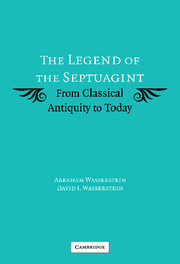Book contents
- Frontmatter
- Contents
- Preface and Acknowledgments
- Abbreviations
- Introduction
- 1 The Letter of Aristeas
- 2 The Hellenistic Jewish Tradition
- 3 The Rabbis and the Greek Bible
- 4 The Ptolemaic Changes
- 5 The Church Fathers and the Translation of the Septuagint
- 6 Among the Christians in the Orient
- 7 The Muslims and the Septuagint
- 8 Yosippon and the Story of the Seventy
- 9 Karaites, Samaritans and Rabbanite Jews in the Middle Ages
- 10 The Septuagint in the Renaissance and the Modern World
- Conclusion
- Appendix: In Partibus Infidelium: Zosimus of Panopolis
- Bibliography and Sources
- Index
7 - The Muslims and the Septuagint
Published online by Cambridge University Press: 17 July 2009
- Frontmatter
- Contents
- Preface and Acknowledgments
- Abbreviations
- Introduction
- 1 The Letter of Aristeas
- 2 The Hellenistic Jewish Tradition
- 3 The Rabbis and the Greek Bible
- 4 The Ptolemaic Changes
- 5 The Church Fathers and the Translation of the Septuagint
- 6 Among the Christians in the Orient
- 7 The Muslims and the Septuagint
- 8 Yosippon and the Story of the Seventy
- 9 Karaites, Samaritans and Rabbanite Jews in the Middle Ages
- 10 The Septuagint in the Renaissance and the Modern World
- Conclusion
- Appendix: In Partibus Infidelium: Zosimus of Panopolis
- Bibliography and Sources
- Index
Summary
Muslim writers who mention the Septuagint are not numerous. They are only about a dozen in number, spread out over a period of some eight centuries, from the ninth century to the seventeenth, from the time when Arab Islam was at its expansive height until after the decline of Arab culture, a period when the Islamic world had already long begun to close in on itself. Nearly all our Muslim writers who use the story borrow it from Christian and Jewish sources, not directly but via loans from each other. The only significant exception is Ibn Khaldun, in the fourteenth century, and even in his case the difference is more apparent than real.
As a group, these writers differ from the Christians in that fewer of them write, at least in relation to the Septuagint, on religious subjects. They deal with the story in a variety of ways but most fall into a single group, concerned with the chronology of the pre-Islamic period.
For Muslims the Bible, in whatever form, whether that of the Christians or of the Jews, and in whatever language, did not enjoy very high status. Despite Islamic recognition that God had sent divine messages to both the Jews and the Christians, Muslims never fully accepted that the texts regarded as holy by followers of these two faiths in fact represented God's message faithfully.
- Type
- Chapter
- Information
- The Legend of the SeptuagintFrom Classical Antiquity to Today, pp. 174 - 191Publisher: Cambridge University PressPrint publication year: 2006

